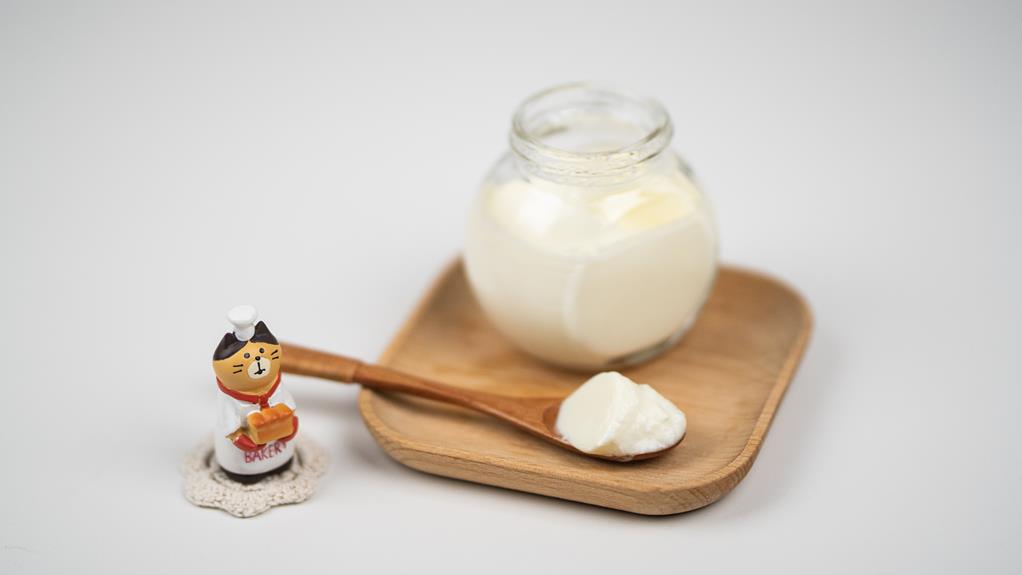Curd has been a staple in many diets and home remedies for centuries, but it's not without its side effects. Whether you're looking for digestive relief or are just curious about the potential risks, understanding the effects of curd consumption is key.
Let's explore the potential downsides of eating curd and how to minimize them for improved digestive health and a liberated lifestyle.
Potential Side Effects of Curd Consumption
You may experience some potential side effects from consuming curd.
While curd is known to be a healthy source of protein and other nutrients, it can also cause stomach cramps and gas bloating.
It's important to drink plenty of fluids and pay attention to your body when eating curd, as it can be difficult to digest.
Be sure to only consume curd in moderation to reduce any negative side effects.
How to Identify Allergic Reactions to Curd
If you're eating curd and experience symptoms such as itching, rash, nausea, or difficulty breathing, you may be having an allergic reaction to it.
Identifying triggers and delayed reactions can be tricky, but there are methods to help:
- Keep track of the ingredients and when symptoms occur.
- See a doctor for a skin prick test, or an allergen-specific IgE blood test.
- Avoid further consumption of curd and watch for any other signs.
Risks of Food-Borne Illnesses From Curd
If you're eating curd, you're at risk of food-borne illnesses, so be sure to take precautions.
Curd can become contaminated with toxic bacteria, parasites, and viruses that can cause severe illnesses.
To prevent contamination, always buy curd from reputable sources and store it correctly.
Make sure to cook it to the recommended temperature, and keep it separate from other food items.
It's important to be aware of the risks and follow food safety guidelines to keep you and your family safe.
Steps to Reduce the Negative Effects of Curd
By taking the proper precautions, you can reduce the negative effects of curd. Store it in a cool, dry place; avoid eating curd that has been kept for too long; and choose curd that has probiotic benefits.
Curd can help maintain digestive balance and provide other benefits, but it must be consumed responsibly to avoid side effects. Enjoy its probiotic benefits while caring for your body's health and wellbeing.
Alternatives to Curd for Digestive Health
Would you like to know some alternatives to curd for digestive health?
While curd is a great source of probiotics, it's not the only one. Consider incorporating other probiotic-rich foods like sauerkraut, kimchi, and kefir into your diet for their numerous health benefits.
Other alternative sources of probiotic benefits include cultured vegetables, miso, and natto.
With so many options, you can easily find a probiotic-rich food that suits your taste and lifestyle.
Frequently Asked Questions
How Long Do the Side Effects of Curd Last?
Eating curd can bring many benefits, but it can also have side effects. How long these last depends on the individual. Generally, they may be experienced for a few hours or days, but it's important to pay attention to your body.
Does Curd Have Any Nutritional Benefits?
Yes! Curd is packed with probiotic benefits and can help those with dairy allergies. It's a nutritious, versatile food that can help liberate your body and health.
Is It Safe to Consume Curd While Pregnant?
When it comes to consuming curd while pregnant, it's best to play it safe. Have a risk assessment done and be sure to control portions. There's no need to go overboard; a little goes a long way. Be mindful and stay informed to ensure a safe and liberating pregnancy.
What Are the Differences Between Different Types of Curd?
When it comes to curd, there are differences in eating habits, storage tips, and health benefits. Enjoy the variety of curd to suit your tastes and needs! Be mindful of storage and eating practices for optimal health.
Is Curd an Effective Remedy for Digestive Issues?
Yes, curd can be an effective remedy for digestive issues. It's high probiotic content helps improve dietary habits and encourages beneficial bacteria in the gut. Try incorporating curd into your diet for a healthier digestive system.
Conclusion
Curd can be a great addition to your diet if enjoyed in moderation, as it has many health benefits.
But be aware that it can also have side effects, so it's important to be aware of the potential risks. If you experience any allergic reactions, food-borne illnesses, or any other negative effects, it's best to talk to your doctor and consider alternatives.
Remember, although it's healthy, you should always enjoy curd in moderation for the best digestive health.






